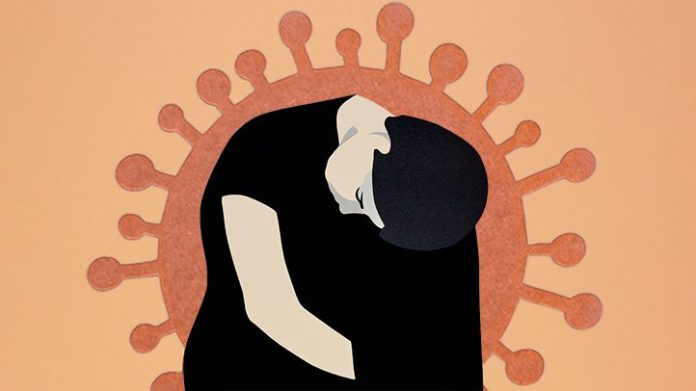This article is written by Jatin Sharma.
Introduction
Suicides have already been a growing menace in India, and lockdowns due to the extensive spread of Coronavirus have made the matter even worse. According to NCRB’s report on Accidental Deaths and Suicides, 1,39,123 people committed suicide in 2019 all over the country due to various causes.[1] People being forced to stay at home, with many struggling with unemployment and salary cuts, has only worsened the existing problem of battling other life problems. A study shows a 67.7% increase in reported cases of suicides and attempts to suicide in time period of 24th March to 3rd May 2020 compared to the same time period in 2019.[2] Factors like financial distress, fear of catching the virus, detachment from society, fear of uncertainty of the future, etc., coupled with lack of medical attention and awareness, have made significant contributions to this spike of cases.
Reasons for disturbed mental health
Corona pandemic has claimed the loss of thousands of lives and lakhs of rupees from families all over the county and negatively affected the mental peace of every person in one way or the other. School and college students were forced to resort to online mode of classes and miss out on many extra-curricular activities, the working class had to switch to work-from-home, and many of them were even let go by employers as companies suffered a lot of financial losses, all kinds of sports and fitness centers were shut. Few reasons for mental distress are as follows:[3]
- Improper sleeping patterns and insufficient sleep due to anxiety and insufficient physical movement.
- Restrictions on traveling and recreational activities.
- Withdrawal symptoms due to substance use disorder with people addicted to alcohol and drugs and unable to access these substances due to lockdown.
- Feeling of paranoia, fear, and uncertainty due to prolonged lockdown continuous negative news in print and digital media.
- Lack of physical interaction with society, loss of decisiveness, poor memory and concentration.
- Irregular and careless eating habits.
- Perpetual concern for family members working as frontline workers.
- Loss of near and dear ones.
In extreme cases, people can resort to taking unfortunate steps like an attempt to suicide, especially when no specialized help is available or provided to persons in need.
Duty of the State
Article 21 of the Indian Constitution guarantees the right to life to everyone. Along with this, Article 47 talks about the state’s duty to improve the level of nutrition and living standards of the people. It also emphasizes the state’s responsibility to discourage the use of alcohol and drugs other than medical purposes.[4] A person’s health certainly includes a person’s mental and emotional well-being, as, without these, one cannot operate at the highest level of one’s potential.
Pursuant to the constitutional mandate, the Parliament came up with the Mental Healthcare Act of 2017 (the Act), which aims to help and provide treatment to persons with Mental illness, and the term is defined in section 2(s) of the Act as “mental illness means a substantial disorder of thinking, mood, perception, orientation or memory that grossly impairs judgment, behavior, capacity to recognize reality or ability to meet the ordinary demands of life, mental conditions associated with the abuse of alcohol and drugs, but does not include mental retardation which is a condition of arrested or incomplete development of mind of a person, especially characterized by sub-normality of intelligence.”
The Act provides for setting up State and Central mental health authorities that can grant license and regulate mental health establishments in their respective jurisdictions. The Act also gives the following rights to persons with mental illness:
- Right to access mental healthcare and treatment from mental health services run or funded by the government.
- Right to no discrimination on the grounds of gender, religion, caste, disability etc., while receiving treatment.
- Right to a high standard of medical treatment, sheltered accommodation, and related services.
- Free of cost treatment for patients below the poverty line.
- Right to live with dignity.
- Right to continentality in respect of his mental health and treatment.
- Right to maintain personal contacts and communications.
One provision that stands out in this Act is section 115, which decriminalizes attempt to suicide under section 309 of the IPC and says that whoever attempts to commit suicide shall be presumed, unless proven otherwise, to have severe stress, and it shall be the duty of the government to arrange for his treatment and rehabilitation. Section 29(2) of the Act specifically provides for the appropriate government to design and implement special programs to promote mental health and prevent suicides in the country.
Ground reality
Disappointingly, the implementation of this progressive Act has been slapped with ignorance of Central as well as many State governments. Only 19 states had set up state mental health authorities until August 2019. Tripura was the only one to have set up Mental Health Review Board, and the Central government has allocated much less than enough funds for mental health care every year.[5] Maharashtra, Andhra Pradesh, Karnataka, Gujarat, and Kerala are among the 19 states who have set up mental health authorities.[6] A large portion of society already stigmatizes people suffering from mental illness. This level of disinterest in governments in setting up state mental health authorities and mental health review boards is delaying the help they should already be getting.
The Hon’ble Delhi High Court[7] and Uttarakhand High Court[8] had particularly reprimanded the respective state governments for not having set up mental health authorities. In a PIL filed in Hon’ble Himachal Pradesh High Court by a law student indicating that there was a substantial rise in the number of suicide cases in the state during the lockdown, the court passed an order on 28th August 2020 directing the government to activate a suicide helpline number within three weeks.[9]
Later, Himachal Pradesh State Mental Health Authority also announced that it would be conducting a survey to study the psychological impact of the pandemic on people considering a sudden spike in suicide cases from May to July.[10] The survey found that 2.42% of the participants had thought about suicide, and only 4% of the participants consulted with a psychiatrist regarding their depression and anxiety.[11] This reveals a dangerous reality that is generally not discussed in society but needs just as much attention and action as any other physical or financial problem.
Surprisingly, in India, almost all of the suicide helplines are operated by NGOs, while it should ideally be taken upon by state and central governments as a primary duty, to provide immediate help to the ones in need.[12] This is where healthcare authorities could have played an immensely vital role by initiating a special program for spreading awareness and starting a special hotline dedicated to consultation and rehabilitation of mentally distressed persons in these unprecedented times.
Conclusion
All these gaps in mental healthcare systems can be filled by the diligent and timely implementation of the Mental Healthcare Act, 2017. The sole aim of enacting the law is to provide must-needed and medically accurate treatment to people with mental issues. Suicide prevention and providing consultation in distress is part and parcel of this aim.
In India, about 14% of the total population suffers from some or the other mental disorder, and less than 30% of them get the required medical treatment.[13] In many of the cases, they get labeled as insane or lunatics and are mistreated by society. Suppose peers, friends, and family give proper attention and guidance at the time when a person is struggling with some mental issue. In that case, the problem might be solved at an early stage itself, but instead, a route of ignorance is opted, which only aggravates the problem. Even the Hon’ble Supreme Court decided, in a review petition,[14] to commute the death sentence to life imprisonment of a death-row convict on the grounds that he had been suffering from a mental disorder for almost 12 years and it would not be just and fair for a patient of mental disorder to be executed and ordered the government to provide medical help to the convict under appropriate provisions of Mental Healthcare Act, 2017 while upholding its ruling in Navneet Kaur v. State (NCT of Delhi)[15]. The Act is a very powerful and robust piece of legislation and can prove to be a boon for people struggling with mental issues.
References
[1] https://ncrb.gov.in/sites/default/files/ADSI_2019_FULL%20REPORT_updated.pdf
[2] Soumitra Pathare, et al, Analysis of news media reports of suicides and attempted suicides during the COVID-19 lockdown in India, 14, INT J MENT HEALTH SYST, 2020, https://ijmhs.biomedcentral.com/articles/10.1186/s13033-020-00422-2#Sec4
[3] PK Dalal, et al, Emerging mental health issues during the COVID-19 pandemic: An Indian perspective, 62, Indian J Psychiatry, 2020, https://www.indianjpsychiatry.org/article.asp?issn=0019-5545;year=2020;volume=62;issue=9;spage=354;epage=364;aulast=Dalal#ft5
[4] Vincent v. Union of India, 1987 AIR 990 : 1987 SCR (2) 468
[5]10 States yet to set up mental health body, THE PIONEER, Oct. 10, 2019, https://www.dailypioneer.com/2019/india/10-states-yet-to-set-up-mental-health-body.html Also see, Ritika Goyal, Three years on, India’s progressive Mental Healthcare Act is dogged by gaps in implementation, SCROLL.IN (Jun. 10, 2021, 6:35 PM), https://scroll.in/article/975401/three-years-on-indias-progressive-mental-healthcare-act-is-dogged-by-gaps-in-implementation
[6] Id
[7] Why no review boards for mental health patients, Court asks authorities, THE HINDU (Jul. 28, 2019, 10:33 AM), https://www.thehindu.com/news/national/why-no-review-boards-for-mental-health-patients-court-asks-authorities/article28737137.ece
[8] Neeraj Santoshi, HC to govt: Form state mental health authority within 3 months, HINDUSTAN TIMES (Jun. 01, 2018, 10:23 PM), https://www.hindustantimes.com/dehradun/hc-to-govt-form-state-mental-health-authority-within-3-months/story-lc9p00ZEynEArA27zmhvcI.html
[9] Pooja Dave, HP HC-Active Anti-Suicide Notice Within 3 Weeks, LAWSISTO.COM (Aug. 31, 2020) https://lawsisto.com/legalnewsread/Nzg3Nw==/HP-HC-Active-Anti-Suicide-Notice-Within-3-Weeks
[10] Bhanu P Lohumi, Suicides up, Himachal to study covid impact, THE TRIBUNE (Nov. 19, 2020, 02:16 PM) https://www.tribuneindia.com/news/himachal/suicides-up-himachal-to-study-covid-impact-172395
[11] 18 pc Himachalis sad, 15 pc have sleep problems: Survey, THE INDIAN EXPRESS (Jan. 2, 2021, 9:00 PM) https://indianexpress.com/article/india/himachal-pradesh-sleeping-bipolar-disorder-hp-state-mental-health-authority-covid-related-messages-pyschiatric-consultation/
[12] Suicide, depression and stress prevention helpline numbers, https://indianhelpline.com/SUICIDE-HELPLINE/3/
[13] Dr. Ramon Llamba, What India must do to solve its mental health crisis?, HEALTHWORLD.COM (Feb. 26, 2020, 1:10 PM), https://health.economictimes.indiatimes.com/news/industry/what-india-must-do-to-solve-its-mental-health-crisis/74314862
[14] Accused ‘X’ v. State of Maharashtra, REVIEW PETITION (CRIMINAL) NO. 301 OF 2008
[15] (2014) 7 SCC 264
LawSikho has created a telegram group for exchanging legal knowledge, referrals, and various opportunities. You can click on this link and join:
 Serato DJ Crack 2025Serato DJ PRO Crack
Serato DJ Crack 2025Serato DJ PRO Crack











 Allow notifications
Allow notifications


